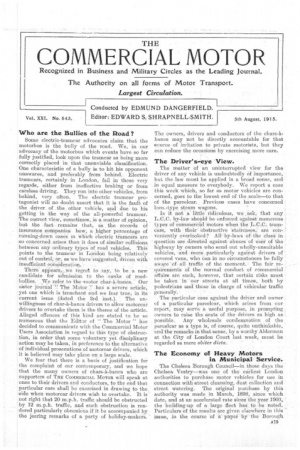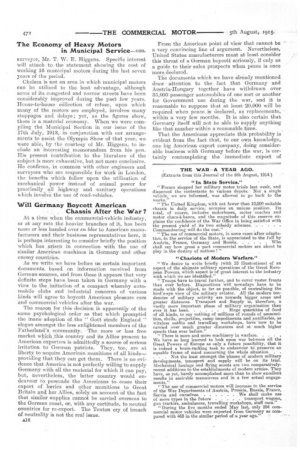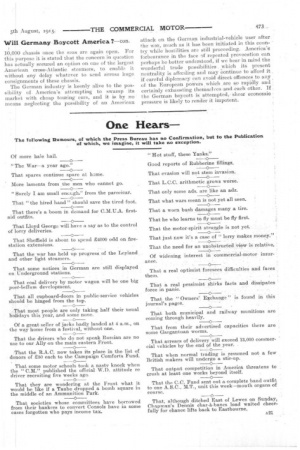Who are the Bullies of the Road ?
Page 1

Page 2

Page 3

If you've noticed an error in this article please click here to report it so we can fix it.
Some electric-tramcar advocates claim that the motorbus is the bully of the road. We, in our advocacy of the motorbus which events have so far • fully justified, look upon the. tramcar as being more correctly placed in that unenviable classification. One characteristic of a bully is to hit his opponent unawares, and preferably from behind. Electric tramcars, certainly • in London, fail in these very regards, either from ineffective braking or from careless driving. They run into other vehicles, from behind, very often. The electric tramcar protagonist will no doubt assert that it is the fault of the driver, of the.. other vehicle, and due to his getting in the way of the all-powerful tramcar. The correct view, -sometimes, is a matter of ,opinion, but the •fact -remains that, a:s _the records of insurance, companies how, a higher percentage of runninged.own 'cases in *filch electric tramcars are so concerned arises than it does of similar collisions between anyordinary types of road vehicles". This points to the tramcar in London being relatively . out of control; or,. as -we have suggested-, driven with insufficient Consideration.'. . .
There: appears, e we regret to ,say, to be a new candidate for admission to the -ranks of road. bullies. We refer to the .motor •char-ii--bancs.". Our sister journal ''! The Motor 7 has a severe article; • yet one which is trenchant and .we fear true, in it current issue (dated the 3rd inst.). The Unwillingness of char-h-bancs drivers to allow motorcar drivers to overtake them is the theme of the article. Alleged offences of this kind are stated to be so numerous that the Editor of " The Motor " has decided to communicate with the Commercial Motor Users Association in regard to this type ofobstruction, in order that some voluntary yet disciplinary action may be taken, in preference to the alternative of individual prosecutions of motorcar drivers, which it is believed may take place on a large scale.
We fear that there is a basis of justification for the complaint of our contemporary, and we hope that the many owners of chars-à-banes who are supporters of THE COMMERCIAL MOTOR will speak at once to their drivers and conductors, to the end that particular care shall be exercised in drawing to the side when motorcar drivers wish to overtake. It is not right that 20 m.p.h. traffic should be obstructed by 12 m.p.h. traffic, and such obstruction is rendered particularly obnoxious if it he accompanied by the jeering remarks of a party of holiday-makers. The owners, drivers and conductors of the chars-hbanes may not be directly accountable for that source ,of irritation to private motorists, but they can reduce the occasions by exercising more care.
The Driver' s-eye " View.
The matter of an uninterrupted .view for the driver of any vehicle is undoubtedly of importance, • . but the law must be applied in a broad sense, and in equal measure to everybody. We report a case this week which, so far as motor vehicles are concerned, goes to the lowest end of the scale—to that of the pareelcar.. Previous cases have concerned . loco.-type steam wagons.
• Is it not .a little ridiculous, we .ask, that any , L.C.C. by-law should be enforced against numerous types of eorninercial 'Motors when the L.C.C. tramcanS; with:their 'obstructive 'staircases, are con' Venielatly overlOoked-? All: by-laws Of the clasS' question are direeted against abuses of user of the " highway by owners who send out wh011y-unsuitable 'vehicles, 'and More particularly against, drivers of covered. vans, who Can in no circumstances be fully al:wire-pi all traffic of the moment., The fair requirenients of the normal conduct of commercial affair's are such; however, that certain riSks must • be taken our streets at all times,: both by pedestrians and those in charge of vehicular traffic generally..
The particular case against the driVer and owner, of a particular parcelcar, which arises from our report, may serve a useful purpose, in prompting owners to raise the Seats of the drivers as high as possible. Any . wholesale condemnation of the parcelcar as a type is, of course, quite unthinkable, 'and the remarks in that sense, by a. worthy Alderman at the City of London Court last week, must be regarded as mere obiter dicta.
The Economy of Heavy Motors . in Municipal Service..
The Chelsea Borough Council—in those days the Chelsea Vestry—was one of the earliest London authorities to purchase motor vehicles for use in connection with street cleansing, dust collection find street watering. The original purchase by this authority was made in March, 1898, since which date, and at an accelerated rate since the year 1900, the building-up of a large fleet has to be noted. Particulars of the results are given elsewhere in thin issue, in the course of 'a..;• paper'hY 'the Borough surveyor, Mr. T. W. E. Higgens. Specific interest will attach to the statement showing the cost of working 16 municipal motors. during the last seven yeses of the period.
Chelsea is not an area. in which municipal motors can be utilized to thebest advantage, although some of its congested and narrow streets have been considerably improved during the past few years. House-to-house c011ection of refuse, upon which many of the motors are employed, involves many stoppages and delays; yet, as the figures show, there is a material economy. When we were compiling the Municipal Section in our issue of the 17th July, 1913, in conjunction with our arrange, meats to assist the Olympia Show of that year, we were able, by the courtesy of Mr. Pliggens, to include an interesting memorandum from his pen. :His present -contribution to the literature of the subject is more exhaustive, but not more conclusive. He confirms, in common with other engineers and surveyors who are responsible for work in London, the benefits which follow upon the utilization of mechanical power instead of animal power for practically all highway and sanitary operations which involve,. the use of road-vehicles.
Will Germany Boycott American . . Chassis After the War ?
At a time when the commercial-vehicle industry, or at any rate the heavier branches of it, has been more or less handed over en bloc to American manufacturers and their business representatives here, it is perhaps interesting to consider briefly the position which has :arisen . in connection with the use of similar Am4.ican. machines in Germany and other enemy countries.
As we write we have before us certain important documents, based on information received from German se,urces, and from these it appears that very definite steps have been taken in Germany with a view to the_ initiationof a compact whereby automobile clubs and industrial concerns of various kinds will agreeto boycott American pleasure cars and commercial vehicles after the war.
The reason for this decision is apparently of the same psychological order AS that which prompted lhe inaneadoption of :the " Gott strafe England slogan amongst the less enlightened members of the Fatherland's, community. • The more or less free market which this country and its Allies present to American exporters is admittedly a source of Serious irritation to 'German patriots. They, too, are at liberty to acquire American munitions of all providing that they can get them. There is no evidence that America is not perfectly willing to supply Germany with all the material for which it can pay, but, nevertheless, the latter country would endeavour to persuade the Americans to. cease their expert of lorries and other munitions.. to Great Britain and her Allies, solely on account of the fact that similar supplies cannot be carried• overseas to the German coast, or, with any certitude, to neutral countries for re-export. The Teuton cry of breach of neutrality is not the real issue. From the American point of view that cannot be a very convincing line of argument. Nevertheless, United States manufacturers must at least consider this threat of a German boycott seriously, if only as a guide to their sales prospects when peace is once more declared.
The documents which we have already mentioned draw attention to the.. fact .that Germany and Austria-Hungary together have withdrawn over 85,000 passenger automobiles of one sort or another for Government use during the war, and it is reasonable to suppose that at least 20,000. will be required when peace is declared, as replacements, within a very few months. It is also certain that Germany itself will not be able to supply anything like that number within a reasonable time.
That the Americans appreciate this. probability is evident from the fact that, to our, own knowledge, one big American export company, doing considerable business with Germany before the war, is certainly contemplating the immediate eXport of 10,000 chassis once the seas are again open. For this purpose it is stated that the concern in question has actually secured an option on one of the largest American cross-Atlantic steamers, to enable it without any delay whatever to send across huge consignments of these .chassis.
The German industry is keenly alive to the possibility of. America's attempting to swamp its market with cheap touringcars, and itis by no means neglecting the possibility of an American attack on the German industrial-vehicle user after the war, much as it has been initiated in this country while hostilities are still proceeding. America's forbearance in the face of repeated provocation can perhaps be better understood, if we bear in mind the wonderful trade possibilities . which its present neutrality is affording and may continue to afford it. if careful diplomacy can avoid direct offences to any of the European powers which are 60 rapidly and certainly exhausting themselves ,and -each other. If. the German boycott is attempted,shear economic pressure is likely to render it impotent.




















